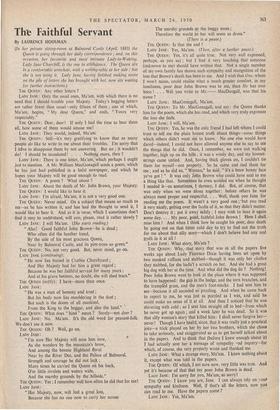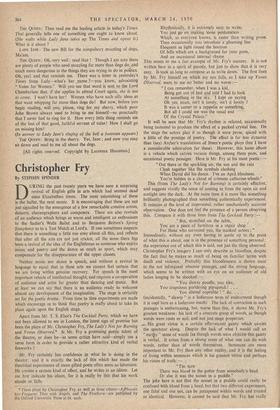The Faithful Servant
By LAURENCE HOUSMAN
(In her private sitting-room at Balmoral Castle (April, 1883) the Queen is going through her daily correspondence ; and, on this occasion, her favourite and most intimate Lady-in-Waiting, Lady Jane Churchill, is the one in attendance. The Queen sits in a comfortable armchair, with a writing-table at her side ; but she is not using it. Lady Jame, having finished making notes on the pile of letters she has brought with her, now sits waiting for further instructions.) THE QUEEN: Any other letters ?
LADY JANE: Only the usual ones, Ma'am, with which there is no need that I should trouble your Majesty. Today's begging letters are rather fewer than usual—only fifteen of them ; one of which, Ma'am, begins, " My dear Queen," and ends, " Yours very respectably."
THE QUEEN: Dear, dear! If only I had the time to hear them all, how sonic of them would amuse me!
LADY JANE: They would, indeed, Ma'am.
THE QUEEN: Still—it's very gratifying to know that so many people do like to write to me about their troubles. I'm sorry that I hive to disappoint them by not answering. But no ; it wouldn't do! I should be inundated! . . . Nothing more, then ?
LADY JANE: There is one letter, Ma'am, which perhaps I ought just to mention. A Mr. William MacGonagall sends a poem, which he has just had published in a local newspaper, and which he hopes your Majesty will be good enough to read.
THE QUEEN: A poem ? What about ?
LADY JANE: About the death of Mr. John Brown, your Majesty. THE QUEEN: I would like to hear it.
LADY JANE: I'm afraid, Ma'am, it is not a very good one.
THE QUEEN: Never mind. On a subject that means so much to me—as he has written it, and has had the thought to send it, I would like to hear it. And as it is verse, which I sometimes don't find it easy to understand, will you, please, read it rather slowly ?
LADY JANE: I will Ma'am. (She starts reading.)
" Alas! Good faithful John Brown—he is dead ; Who often did the heather tread, By the side of his most gracious Queen,
Near by Balmoral Castle, and its pine-trees so green." THE QUEEN: No, not very good. But, never mind, go on. LADY JANE (continuing):
" He now lies buried in Crathie Churchyard ; And Her Majesty had for him a great regard ;
Because he was her faithful servant for many years ; And at his grave betimes, no doubt, she will shed tears." THE QUEEN (softly): I have—more than once.
LADY JANE:
" He was a man of honesty and trust ; But his body now lies mouldering in the dust ; But such is the doom of all mankind,
From thg King to the beggar, and also the hind." THE QUEEN: What does " hind " mean ? Surely—not deer ? LADY JANE: No. Ma'am. It's the old word for peasant-folk. We don't use it now.
THE QUEEN: Oh ? Well, go on.
LADY JANE:
"I'm sure Her Majesty will miss him now, e
As she wanders by the mountain's brow, And among the bonnie Highland floral Near by the River Dee, and the Palace of Balmoral.
Strength and courage he did not lack ; Many times he carried the Queen on his back, O'er little rivulets and waters wide, And the marshy grounds by the hillside."
THE QUEEN: Yes ; I remember well how often he did that for me!
LADY JANE:
" Her Majesty, now, will feel a great loss, Because she has no one now to carry her across The marshy grounds or the boggy moss ; Therefore the world to her will seem as dross."
(There is a pause.)
THE QuEEN: Is that the end ?
LADY JANE: Yes, Ma'am. (Then, after a further pause.) THE QUEEN: Yes, it's all quite true. Not very well expressed, perhaps, as you say ; but I find it very touching that someone (unknown to me) should have written that. Not a single member of my own family has shown such sympathy and recognition of the loss that Brown's death has been to me. And I wish that One, whom I won't name, could realise what a much greater comfort, in my loneliness, poor dear John Brown was to me, than He has ever been ! . . . Will you write to Mr.— MacDougall, was that his name ?
LADY JANE: MacGonagall, Ma'am. • THE QUEEN: To Mr. MacGonagall, and say: the Queen thanks him for the poem, which she has read, and which very truly expresses the loss she feels.
LADY JANE: I will, Ma'am.
THE QUEEN: Yes, he was the only friend I had left whom I could trust to tell me the plain honest truth about things—sonte things which others didn't want me to know. No one else would have dared—indeed, I could not have allowed anyone else to say to me the things that he did. Once, I remember, we were out walking together, high up on the hills ; it was a windy day, and my bonnet- strings came untied. And, having thick gloves on, I couldn't tie them for myself—not properly. So he came and tied them for me ; and as he did so, " Woman," he said, " it's a brew bonny face ye've got ! " It was only John Brown who could have said to me a thing like that. Sometimes he even scolded me when he thought I needed it—as sometimes, I daresay, I did. But, of course, that was only when we were alone together: before others he was always most proper and respectful. . . . Well, thank you Jane for reading me the poem. It wasn't a very good one ;'but you read it very nicely, getting over the faults of it, so that they didn't matter. Don't destroy it ; put it away safely ; I may wish to hear it again
some day. . .. My poor, good, faithful John Brown How I shall miss him And when I think how he caught his poor, dear death
by going out on that bitter cold day to try to find out the truth for me about that silly story—which I don't believe had any real truth in it at all !
LADY JANE: What story, Ma'am ?
THE QUEEN: Why, that story that was in all the papers five weeks ago about Lady Florence Dixie having been set upon by two masked ruffians and stabbed—though it was only her clothes they stabbed, for she hadn't a scratch on her. And she had a great big dog with her at the time. And what did the dog do ? Nothing! Poor John Brown went to look at the place where it was supposed to have happened: the gap in the hedge, and the torn branches, and the trampled grass, and the men's foot-marks. I had sent him to see—because it all sounded so puzzling. And when he came back to report to me, he was just as puzzled as I was, and said he could make no sense of it at all. And then I noticed that he was shi■iering with cold ; so I sent him straight off to bed—from which he never got up again ; and a week later he was dead. So it was that silly woman's story that killed him: I shall never forgive her— never ! Though I have heard, since, that it was really just a practical joke—a trick played on her by her two brothers, which she chose to take seriously, and exaggerated so as to get herself talked about in the papers. And to think that (before I knew enough about it) I had actually sent her a message of sympathy .,nd inquiry—for which, of course, she very properly wrote and thanked me.
LADY JANE: What a strange story, Ma'am. I knew nothing about it, except what was told in the papers. THE QUEEN: Of which, I am sure now, very little was true. And yet it's because of that that my poor John Brown is dead.
LADY JANE: I'm sorry for you, Ma'am, so sorry!
THE QUEEN: I know you are, Jane. I can always rely on .louto sympathy and kindness. Well, if that's all the letters, now you can read to me. Have the papers come ?
LADY JANE: Yes, Ma'am. THE QUEEN: Then read me the leading article in today's Times. That generally tells one of something one ought to know about. (She watts while Lady Jane takes up The Times and opens it.) What is it about ?
LADY JANE: The new Bill for the compulsory muzzling of dogs, Ma'am.
THE QUEEN: Oh, very well: read that I Though I am sure there are plenty of people who need muzzling far more than dogs do, and much more dangerous in the things they are trying to do in politics. Oh, yes! and that reminds me. There was .a letter in yesterday's Times from Lady—what's her _name ?—you know, advocating " Votes for Women." Will you see that word is sent to the Lord Chamberlain that, if she applies to attend Court again, she is not to come. I won't have her! Women who have such silly ideas as that want whipping far more than dogs do! But now, before you begin reading, will you, please, ring for my sherry, which poor John Brown always used to bring to me' himself—so punctually that I never had to ring for it. How every little thing reminds me of the loss of that good, faithful servant of mine! How I shall go on missing him!
(In answer to Lady Jane's ringing of the bell a footman appears.) THE QUEEN: Bring in the sherry. Yes, Jane ; and now you may sit down and read to me all about the dogs.
[All rights reserved. Copyright by Laurence Housman.]































































 Previous page
Previous page